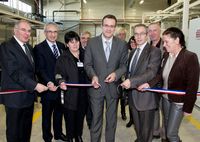Renault Invests - Million In Electric Test Centre, Lardy, France
PARIS – Nov 16, 2011: Renault is pursuing its proactive electric
vehicle strategy with the inauguration of an electric test centre yesterday
in Lardy, France. Renault now offers a range of all-electric vehicles that
deliver the highest levels of performance, safety and quality thanks to the
Group’s €28 million investment and three years of electric
powerplant development.
Dedicated test facilities to guarantee the performance and durability
of electric powerplants
Renault has recently launched Kangoo Van
Z.E. and Fluence Z.E., the first two of the four new-generation electric
vehicles that will be released over the next year. Developing these highly
innovative vehicles has called for an extensive list of tests designed to
cover the performance, safety and durability of the new components: the
electric motor, power electronics unit and battery.
Renault has set up dedicated test facilities – housed at Lardy in an electric mobility test centre which has been gradually expanded since 2009. The centre spans two buildings and around 100 test benches over a surface area of 3,300 sq. metres:
-Eight test benches for electric motors: unlike test benches for internal combustion engines, which are powered by fuel, electric motor test benches run on electricity supplied by a 400V battery simulator. These test benches serve to develop motors and power electronics units and measure performance (torque, power, efficiency, driveability, type approval, safety). The benches also validate the motor’s durability over very harsh temperature ranges, plus vibration. These programmes cover the equivalent of 20 years of operation and/or 300,000 kilometres.
-Six test benches for the power electronics unit (charger, controller, transformer): these benches enable Renault to validate the unit’s resistance to sudden temperature variations coupled with changes in electricity requirements.
-41 benches associated with environmental chambers to test lithium-ion batteries: these benches simulate accelerated ageing of the lithium-ion batteries by repeated full and partial charge/discharge cycles (standard, accelerated, fast) under different temperatures.
Each and every component of the battery – cells, modules, battery pack and the power electronics unit – is tested and validated, from the basic unit to the entire system. Some 170,000 hours of testing are carried out over one year at Lardy by some 30 specialised engineers and technicians.
-58 other test benches devoted to improving the performance of the 12V starter batteries and researching second-life applications for lithium-ion batteries.
All this work comes on top of the input of Renault’s partners on their own test benches.
Batteries: ‘abuse’ tests for greater safety
The
Lardy centre runs a series of 15 different tests on the lithium-ion
traction batteries, simulating the most extreme conditions
(‘abuse’ tests). Short-circuiting, fire, immersion, accidental
damage…nothing has been left to chance. Some 100 such tests will be
conducted in 2011 alone, either in-house or at the facilities of specialist
partners[2].
Renault’s engineering staff at Lardy have benefited from building new skills as part of a staff re-training and mobility programme. They have developed new testing expertise in electric motor technology. Abuse testing in particular calls for skills in a broad range of fields: powertrain engineering, electrical engineering, chemistry (gas analysis), electrochemistry, thermal management, crash/impact testing, measurement and instrumentation, safety (testing with potential risks), fire, etc.
“The Lardy test centre is supporting Renault’s move into the electric vehicle market – now a concrete reality after the launch of our first electric vehicle, Kangoo Z.E. Our goal was to sell vehicles that are reliable, powerful and 100 per cent safe. Lardy has helped us to achieve that goal thanks to 170,000 hours of testing in 2011. Investing in this centre will enable us to pursue and support new developments in electric powerplant technology and make Renault the leading manufacturer of electric vehicles in Europe,” says Jacques Prost, Renault’s Senior Vice President of Powertrain Engineering.



